Paul Edgeworth:
CLASS OF 1963

Bishop Neumann High SchoolClass of 1963
Philadelphia, PA
Catholic University of America - Graduate SchoolClass of 2001
Washington, DC
Catholic University of America - LawClass of 1984
Washington, DC
St. Joseph's UniversityClass of 1967
Philadelphia, PA
St. Joseph's SchoolClass of 1959
Philadelphia, PA
Paul's Story
Synthesizing Spiritual Growth and Cosmic Evolution
pje/pi.ai
The theological concepts of Bernard Lonergan's vertical finality and Pierre Teilhard de Chardin's Omega Point, while distinct in their origins and focus, share common ground in their emphasis on progression and union with the divine. Scholars such as Elizabeth A. Johnson, John F. Haught, and Louis Roy, O.P. have endeavored to bridge the gap between these concepts in their works; thus, creating a more comprehensive understanding of the relationship between God, the universe, and humanity.
Lonergan's vertical finality pertains to the innate human desire for understanding, which ultimately leads to a transcendent union with God. This concept places emphasis on the intellectual and spiritual growth of individuals as they journey toward their ultimate purpose. In contrast, Teilhard's Omega Point presents a cosmic vision, proposing that the universe evolves toward a pinnacle of complexity and consciousness, where all creation converges and unites with the divine. This concept integrates evolutionary theory with theological principles, asserting that the development of the universe is inherently purposeful and directed.
Elizabeth A. Johnson, a theologian, and professor at Fordham University, integrates Lonergan's and Teilhard's ideas in her works, particularly in her book "Ask the Beasts: Darwin and the God of Love." Johnson explores the connection between the human pursuit of understanding and the cosmic journey toward the Omega Point, accentuating the evolutionary nature of the universe and the unfolding of God's presence within creation.
John F. Haught, a senior fellow at the Woodstock Theological Center at Georgetown University, draws upon both Lonergan and Teilhard in several of his works, including "God After Darwin: A Theology of Evolution" and "The Promise of Nature: Ecology and Cosmic Purpose." Haught investigates the interplay between theology, evolution, and cosmic purpose, reconciling individual spiritual growth with the grander cosmic journey toward unity with the divine.
Louis Roy, O.P., a Dominican priest and former president of the Canadian Theological Society, has contributed extensively to the dialogue between Lonergan's and Teilhard's thought. In his book "Transcendent Experiences: Phenomenology and Critique," Roy highlights the compatibility of their ideas, suggesting that Lonergan's methodology and emphasis on human interiority can be integrated with Teilhard's vision of cosmic evolution and the Omega Point, leading to a more comprehensive understanding of the human spiritual journey.
The Cows of Bashan
They lie on carved beds of cypress
horned with tusks
inlaid with lapis-lazuli
They lounge on purple-dyed couches
luxuriantly pillowed
They dine on sweet- roasted lamb
the fat kidneys of ram
They enjoy celestial music of lyres
soothing to ring-pierced ears
They have plentiful and delightful wine
to prolong the hours of the night
They use the finest island-imported lotions
to smooth and pamper their flesh
but
They do not concern themselves
over the poverty of the land
and the suffering of its people
for
They only dream of well-muscled youth
paddling swift- papyrus boats
While cool breezes press fine-woven linen
against their complacent skins
God is verb
Was
Is
Will be
God is relation
Father
Son
Holy Spirit
Supposing God placed a certain quantity of motion in all matter in general at the first instant he created it, we must then either admit that he always preserves the same amount of motion in it, or not believe that he always acts in the same way. Descartes in so pondering is providing a conservation law, one in which the quantity of all motion in the cosmos is conserved. Since God is immutable and acts immutably, Descartes determines that the quantity of motion in nature does not change. It is a positive quantity that neither increases nor decreases, but remains constant. If we are perplexed as to what “quantity” entails, Descartes clarifies it for us in his Principles of Nature, Part two, Article 36, where he states motion has a certain determinate quantity; and this may be constant in the universe as a whole while varying in any given part. Thus if one part of matter moves twice as fast as another which is twice as large, we must consider that there is the same quantity of motion in each part; and if one part slows down, we must suppose that some other part of equal size speeds up by the same amount. For we understand that God’s perfection involves not only his being immutable in himself, but also his operating in a manner that is always utterly constant and immutable. So if we were unsure as to the meaning of the term “quantity,” and therefore what was conserved in totality, Descartes has now told us that it is “size times speed.” It is this formula that maintains the total quantity of motion in the world.
Absence of the Gods
Sing, Muses, sing of the Absence of the Gods, and of the Noos of Zeus.
Broad browed Zeus atop Olympus Massif castes his eyes down upon his golden terrace where he sees two gods approaching each other, Apollo from the West, and Dionysus from the East.
Dionysus: Apollo, it is evident that mankind no longer offers sacrifices to us. From their perspective, it appears that we are absent from their lives, and no longer grant gifts from beyond.
Apollo: Yes, sacrifices are no longer offered up to us. Nor do answers to prayers or laws proceed down from us. Let us call this the old way, the way of vertical transcendence.
Dionysus: I take it then that the new way would be the way of horizontal transcendence.
Apollo: Yes. Horizontal transcendence is not imposed downward, but remains on the level of the human. It is not something alien permanently suspended and existing on a plain above and apart from what is human.
Dionysus: The key then to horizontal transcendence would be found in the order and authority imposed by customs and institutions created by man. This is a recognition that human beings are the makers of their history and institutions. Such man-made institutions do govern individual men and are external to the individual, but they do not govern from a level that supercedes the human dimension. It is a reality which exists on the plain of men and would not exist without men.
Apollo: Yes. But from the perspective of the gods, there is still a key role for us in horizontal transcendence. The providence of the gods can be seen as underlying the institutions of man even though man himself is not always aware of the workings of the gods. It is the gods' immanence at work and it gives rise to a transcendence which is manifested in the institutions that man has created. Humans think that the gods are no longer there. They do not see that the gods are still there working behind the scenes of mankind's reality.
Dionysus: Yes, institutions created by man, but reflecting a divine providence acting for the preservation of man whether man is aware of it or not.
Apollo: And this divine providence is not only a matter of preserving man, but also of placing him in circumstances that involve a struggle for self-overcoming -- even a heroic life for the best of men.
Dionysus: Thus, despite suffering, evil, and death, life and living is still worth the effort for man.
Apollo: Precisely so, and the fact that man creates a world out of adversity is in the end not inconsistent with Zeus's eternal plan for the order and harmony of the cosmos. It is man's attempt to bring order to the world just as Zeus has brought order to the cosmos.
Dionysus: Yes, Apollo, horizontal transcendence reflects a recognition that divine providence is immanent in the workings of man as reflected in what man has created.
Apollo: Indeed, for there is real value to be found in looking at human finitude in a landscape from which the gods have been removed, at least so in appearances, from the perspective of man. All theology and philosophy, all arts and sciences, flow from man's attempt to understand the world that is given to him in experience.
Dionysus: Well said, Apollo, and given such a view, who is to say that it is not after all a dancing god, looking down from high atop Olympus, who takes delight in what man is striving to obtain.
Apollo: Dionysus, I find myself amused by your notion of a dancing god. An apt image worthy of the god of wine, grapes, and revelry. Would you care to elaborate further?
Dionysus. Very well, Phoebus Apollo, god of music and eloquence, as you well know I grasp things best as a whole rather than proceeding linearly. What I see then is a dancing circle of power, past, present, and proceeding forever, pulling man closer and closer to us gods.
Apollo: Ah yes, take us and the Aegis Holder looking down upon us from high atop Mt. Olympus. We have then Father nucleus and us two.
Dionysus: Yes, you see the image much as I do. It was no accident that the mortal Oppenheimer entitled his experiment the Trinity. But expand from Father Zeus and us two, and see Zeus and all the gods and thus the entire dancing circle of power.
Apollo: Yes, far more than just a Leibnizian space-creating relationship is what I see, and grasp then with you.
Thunder headed Zeus, Son of Cronus most high, looked down and smiled. He was proud of his two sons, Apollo, born of Leto, and Dionysus, born of mortal Semele, for they had caught a glimpse of his plans, albeit just the smallest glimmer, for he had plans far more grand than Mekone for man. Such is the Noos of Zeus.
If "w", "r", "a" are pickled, then "wb", "rb", "ab", so ...Expand for more
sayeth Monty the Python. No snake intended.
The Forgotten Mean in Aristotle
What exactly is the life expressing nous for a human being? Is it one in which nous alone can be expressed? No, for this would be the life of God and not of a human being. It must be a life expressing phronesis that expresses nous. It can only be this, for no human being can live a life in which nous alone is expressed and none could then be eudaimon doing so. We can say then that the life that expresses phronesis that expresses nous consists in the whole good of man. What is divine in us is not the whole of us. The activity of contemplation is not exclusively our happiness. When Aristotle tells us to achieve a life of contemplation as far as is possible, we must keep in mind the constraint that is implied here, for the activity of contemplation must be pursued not as a God would, but as a human would. When we engage in intellectual inquiry as human beings, we desire to know the answer and not just to occupy ourselves in looking for it. To pursue contemplation as far as possible means as far as the circumstances of practical reason allow. The happiest life will be one that is devoted to contemplation and to the cultivation of other human virtues. It is a life that will understand and reside in the difference between rules of moderation and a moderation of rules, which is to say that in the end Aristotle gives us no procedural rules on how to balance theoria and phronesis, and it is fitting for him not to have done so. If we do not find in Aristotle's account of the nature and chief end of man acceptable answers to all the questions that are raised, it does not mean that we need not try to answer them now and for ourselves in our circumstances. This then is the forgotten mean in Aristotle.
Es gibt Il y a
Ob-ligare. Tout autre. Re-ligare
Tout autre est tout autre
Quid ergo amo, cum deum meum amo?
Viens! Viens! Oui, oui
Es gibt. Il y a
Relation. Ereignis. Differance
Khora
In/Out of the flux
Traces. Cinders
The Event
Elliptical economies
Auto-immunized economy
The Call
Hope beyond hope
Suspicious of binary oppositions
Metaphysics of presence - a hauntology
Ta me onta
[Das] Gift
A messianic ethics
Always awaiting, always coming
Justice
It spooks
Number Theory Curves over Finite Fields Riemann Surfaces
Sheaves
Is it then in the end all head?
Is it Anna as reincarnation of Tatyana? Or is it forsooth Hamlet's ethereal father?
The latter (pause once more not for a breech but for effect) gives rise to the ghost in the machine, or rather the argument thereof.
"Who's there?"
New Compact: To strive against self shallowness. To inscribe depth to an electronic flatland.
Constatation: Observed from path, much writing and little know
(pause for private chuckle!)
Compact: To entertain and not to test.
Constatation: The "way" of the thinker departs from the usual path of man.
A Definitive History
It be with great expectations that i will approach or even exceed the truth, that i undertake this history. Once upon a time, there be two solipsists. At the center, thought thinking thought. Coextended with the horizon, visceral bliss, lipid consciousness. To one another, never be manifest. Somewhere be monad to study topology of enzymes, if monad ever be aggregated.
i lay down my pen for this be a fine n-dimensional history. But if it be not, well then the play's the thing. All needed be - quantum programmer/stage manager, cosmic chorus, and props.
1st choral response: All manner of men be surds
2nd choral response: Socrates be manner of manner of man
3rd choral response: Please pass the jelly!
As for props, only be two. One, a thirty trillion dollar ____ propelled starship with sticky note attached reading, "not man's destiny". Second, a small, plastic globe with sticky note attached reading, "man's destiny". Tricky business, writing histories and high drama. But you will always get there, says Alice. Exit stage left. Kabuki dancer enters stage right. Need more props. Perhaps a very large fish, or a right triangle might suffice. Now offstage, i gird my loins in preparation for infinite jest. Felines be finicky, for they think they be gods (despite what Descartes may think). Blame it on the 'gyptians. But that be another history narrated from afar.
Explication and Discourse re Ricorso
(as previously promised)
FORE-STRUCTURE
An explication is possible only to the extent that it is prepared for in advance by an anticipatory Abschattung. Thus the explication can appear under the condition that it can insert itself within a frame of expectations. An explication must not be merely apprehended, but in order to be apprehended, must be construed or apprehended in advance (Aufgefasst in voraus).
EXPLICATION
Since it is explicitly stated that the poem is not a poem but purportedly a prodigious event, an explication is warranted. We know that something is happening. Since it is encrusted in information, we do not know what it is. Coincidentally, this brings to mind the Berkenstein Bound. Didn't know what Jabberwocky was saying till Humpty spelled it out! Relevant and/or paradigm? Dumpty egg by way of expoundation ezras that some equals are above equals because 1)older and 2)possessed of ubiquitous, rotund intellect. For cycle swing, see S. Weinberg, et al - as to how this might occur. You and ye and me are the three blind musketeers disguised as yank and yin. And two let be makes even three. The impossible still seems possible. The rest is more albeit less. A pyncheon more, but lesser still. Tis Eliot I see. Thanks be to Boom'n Bloomen! Ah, Abelard, Ah, Heloise - the mind is a forest dark! I'm only hear for the sexual nuance and the ambiance. Strange, I have this craving for. I can hear the sea! I always believed that. See how they run. A herd of philosophers in flight! Revolutionary aphrodisiac or ultimate borification. They flee from what? Grothendieck forsoothe us not!
DISCOURSE
Common-sense understanding and description involve a grasp of the relation of things to us. Theoretical understanding and explanation involve a grasp of the relation of things to each other. Everyone understands the notion of going faster, but few understate that acceleration is going faster, generalized to include going slower and enriched with all the implications of the second derivative of a function; hence, the distinction between description and explanation and between common-sense and theoretical understanding. I gained this insight thru the Institute, by way of Lonergan, good old Bernie, that is.
LAGNIAPPE PRAYER
Oh ye gods of sky and earth and two and ten dimensions, deliver us from mechanistic doltification! Make more effusive the hereafter. Hence and thence. Amen.
A Final Note in Passing - One fleeting image, if you will, before the grand narrative resumes. "Far better to be young and foolish than old and wiley," said Zarathustra to the aardvark. The latter knowingly winked and replied, "But you would agree, however, that we owe an 'in order to' to Aristotle!"
A Column of H____ in Short Paragraph Form
(Dedicated to Jacques Derrida)
un folding inside/outside virginal/non-virginal you make possible the play in the difference you are the either/or between the last either/or--arche-writing incarnate inside/outside virginal/non-virginal man has a protuberance jutting out of his head foreskins foreseeing foundations of a meta physical sort but you make possible the play in the differance-- over folding folding out folding out folding over--inside/outside virginal/non-virginal you are the either/or between the last either/or-- sous rature--it will have been said that the truth is that there is no truth not now or evermore for future past to come to have gone to be yet you make possible the play in the difference the play in the differance--jot jot jottings jac da jottings of--enter disseminations--en folding
Ricorso: A Poem Complete with Explication and Discourse
THE POEM
THIS IS NOT A POEM! THIS IS NOT A POEM! THIS IS A PRODIGIOUS EVENT!
Yet Again
- I think
Poopahs, Tortollenies, Grand-Exhorbitant Lima-Beans
Chucking down
De-constructive mythfollogies
(Oh the cleverness of this)
Endless angsts of influence
More than a were-dog has flies
(Rhythm fooled you not I)
Kicking the bedding out-of-the wedding
Putting the bend in the knee
Et tu familias humanis
NADA IN RECOMENSIONI
GET YOURSELF
BLOAT-BELLIED ON AIR
IT'S SO ETHERIAL!
Whipawhirled dervish
Man your ars
Kickakickakick
A will-aimed sole/
(In the)soul
Is what you lack!
Smack-a-whack!
All lost live again
Grand-Exhausted Limba
Beans, Tortillinis, and Poopays
So on and so fort
Cycle swing
Poopies, Grand Lamarines,
Totulenies command
To the end (of the)
Dumb plodding
Thing march
Go!
O be joyful
Kalou kalay
All will be told
When it suits well
Emotes that would
Be Thoats
Dugongs ahoy
Awash afloat
Tis you and ye
And me
Sanscullottes, sans doute
Sanhyas! Sandhyas!
Sandhyas!
Vah! Suvarn Sur!
Dah Be! Doo Dah!
Dixi
(Rigorously logical it has been
So some say)
O, the thunder of the predeceased
Epprepfftaph! Pfrwritt!
Pyrrpffrrppffff!
Begin. Yet again.
Time enuf to cease
(Explication and Discourse to follow at another time)
Tach Uno
A Hand
Reaches out
Grasping Nothing
Impalpable is
The Infinite
Being is
Non-Being
Is not is not
Non-Being is
Magical Words
Word made World
Will-honed Intellect
Questioning
The Unknown
Tangential Knowledge
Is what it seeks
Here alone
In Space-Time
Is all it can find
Inspired
Energized-in-Love
Actualized Potentialities
United
Cosmic Ubermensch
(Universal observers)
We can all become
...
Register for Free to view all details!
Yearbooks
Reunions
Photos

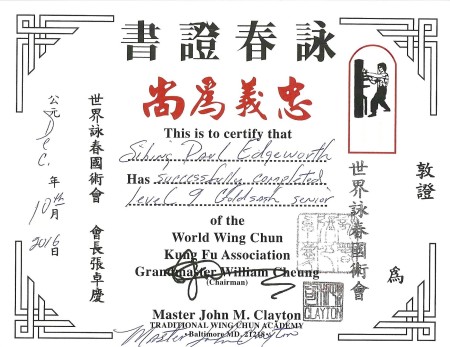
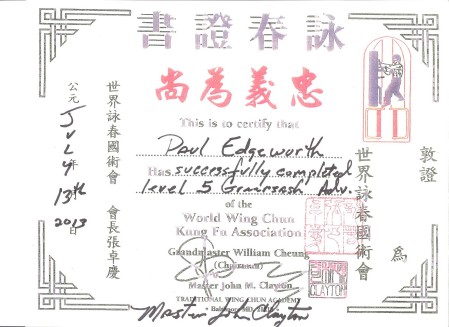
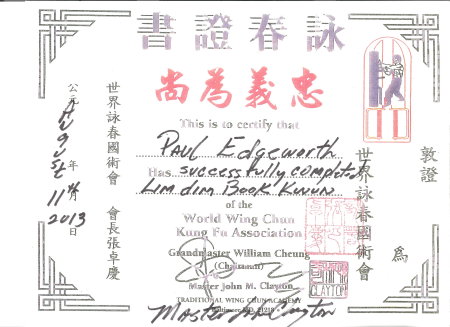

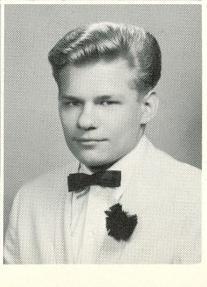

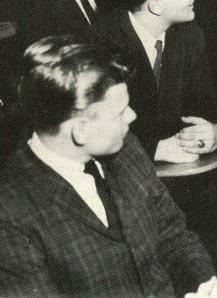
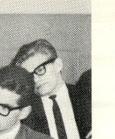
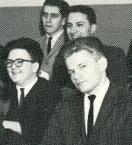
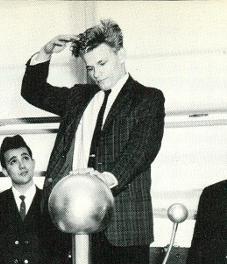





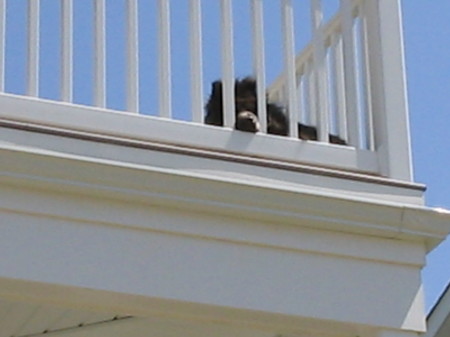























Register for Free to view all photos!


